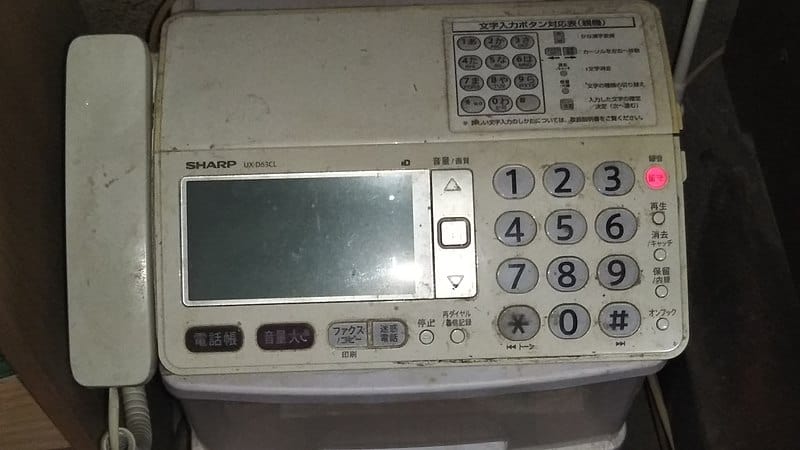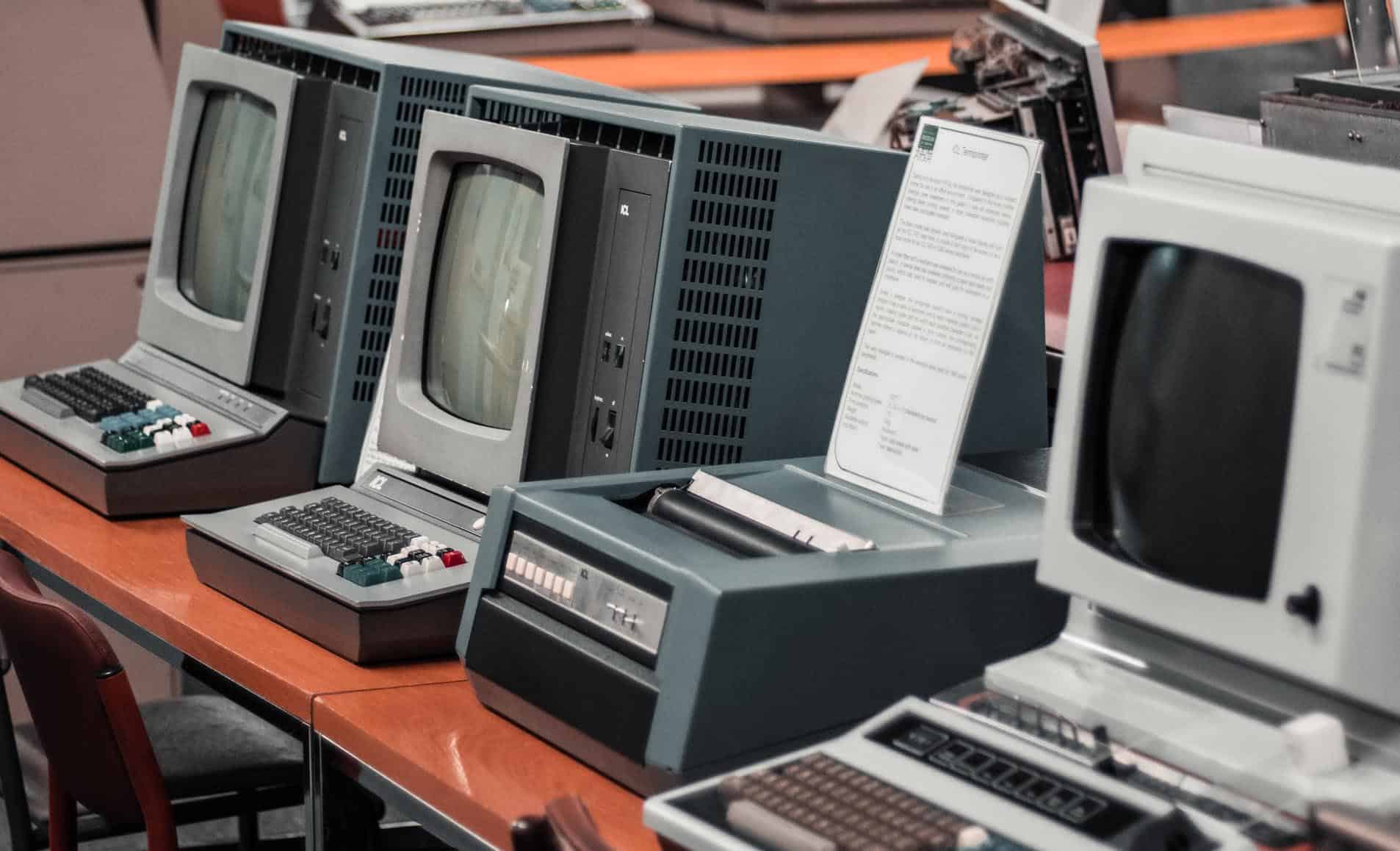On the surface, it’s easy to write off-Japan as a country of flying cars and robot butlers.
However, as with countless things surrounding Japan, the actual situation is a lot more complex.
Today we’re going to discuss Japan’s unusual and perhaps surprising relationship with technology.
Let’s get started!
History of Japanese technology
The basis most people have for Japan being a technologically advanced country does have some truth to it. Well, actually quite a lot!
We’ll talk about it in a little more detail further on in the post, but for now, let’s discuss what makes Japan such a
What old technology does Japan still use?
Let me show you a few pieces of retro technology still very much in use over in the land of the rising sun.
1. Fax machines

Ahhhh, fax machines.
Japan’s guilty pleasure of old tech.
In 2019, the Japanese government did a study to see just how heavily used these machines are.
It turns out basically all Japanese companies and at least 1/3 of households own and use a fax machine.
That’s quite astonishing when you realise it’s a technology from over four decades ago.
Why does Japan still use fax machines?
Well, this can be put down to a few interesting reasons.
The first reason Japan still widely uses the fax machine is because they worked
What I mean by this is between 1970-1990, Japan’s economy grew extremely well. Part of this was because of America’s intervention, which led to a ‘Technology focused’ vision from the Japanese government over many years.
And what piece of equipment flourished as a result of that success?
The fax machine!
Since that time, fax machines and economic (as well as business) success have pretty much gone hand in hand.
Numerous companies are still under the mindset of ‘If it ain’t broken, don’t fix it’, which may partly be to blame for Japan’s current technology plateau.
So even to this day you’ll likely find many Japanese companies where fax machines hold pivotal roles in their infrastructure.
With that said, the last couple of years may have triggered a nationwide attitude shift.
As a wave of ‘work from home’ jobs start to appear, Japan is just as likely as other countries to be a part of that movement. Even if it might adapt a little slower, it’ll still get there in time.
With a complete working environment switch, Japan has realised it’s not set up well enough to cater for its workers to work from home on a full-time basis
That’s why, over the next 5-10 years, I wouldn’t be surprised if email and other productivity and messaging services boom.
The second reason fax machines are widely used is because they’re extremely secure. Though, this is a vision that’s becoming less and less supported.
It’s not that fax machines aren’t secure, it’s just that other equally safe options are popping up every day.
But as we know, Japan is a creature of habit, so will they make the extremely needed change?
The third and final reason why fax machines are still used in Japan is because the ‘individual’ doesn’t technically exist.
Put another way, the little man doesn’t have a voice. And if he did, he’d make sure not to use it.
Though switching from fax machines to modern technology is possible (given enough time), a wide shift is still likely to cause someteething problems.
Nobody wants to be responsible for those difficulties, not even the big companies.
When you realise that simply getting something wrong at work is often a cause for extreme shame in Japan, if starting a countrywide shift of outdated technology had even one small issue, it’s likely to be life changing.
2. DVDs

With over 200 streaming services available around the world, it’s hard to believe a country whose favourite hobby is watching online videos would still use DVDs.
In fact, revenue of dvd sales in Japan was $580,551,510 in 2020.
That’s ‘billion’, not ‘million’.
Though that number has been steadily declining over the last few years, it’s still far higher than the US.
In the same year, Americans spent only $32.5 million on DVDs. That’s a huge difference.
Why does Japan still use DVDs?
Let’s attack this problem from two directions.
The first reason many people in Japan still buy DVDs is a cultural one.
Here in the UK, I’m often met with a miserable face as I hand over my money to a shop assistant, and they throw my item back at me like I’ve caused their terrible day.
Service and customer happiness is definitely an afterthought in most shops, that’s for sure.
But if you’ve ever shopped in Japan, you know it’s the polar opposite.
Not only do the majority of shops have a designated greeter that proudly exclaims ‘いらっしゃいませ!’ (Irasshaimase!) meaning ‘welcome’, or ‘come in!’, but the entire customer journey is often different.
Everyone I’ve ever encountered in a Japanese store goes above and beyond what is expected of them, and yet never seems to pester.
My debit card (if the shop accepts them) is handed back to me with two hands, and my item is wrapped up and finished off with a beautifully decorated piece of Washi tape.
It’s an experience that not even people who have grown up with will take for granted, and that means shops aren’t going anywhere for a long time yet.
Consumers typically take this appreciation into unboxing, using, and storing their purchases, potentially a reason for Japan’s thriving and immaculate second hand market.
The next reason DVDs are still used and bought in Japan is a slightly more technical one.
For many of us here in the west, we take streaming services for granted.
Whilst lately Japan has seen a rise in the usage of these sites, there are still a huge amount of CD and DVD rental shops around the country that are extremely popular with the regulars.
Similarly to CDs, it’s also the case that many people don’t really know these streaming services exist.
It’s not to believe when you realise that broad consumer usage of the internet is still a relatively new things in Japan.
And damn do those websites look like they were made in the 90s…
3. CDs

CDs, much like DVDs, are still extremely popular in Japan.
I won’t repeat myself too much, but most of the reasons are extremely similar to DVDs
Are CDs popular in Japan?
CDs have seen a steady decline over the last few years with the strong influence of streaming services, but they aren’t out of the game yet.
However, when you compare the numbers to those of countries across the world, Japan still sits very high.
Physical media, it would seem, still holds a spot in the hearts of many Japanese people.
It’s actually quite refreshing to find a nation not entirely overcome by digital services when the rest of the world has gone mad for them.
Why are CDs still popular in Japan?
Let me answer this question with another question.
Do you know of anywhere in your home town, or country, that actively sells CDs?
No?…
Well in Japan, there’s a place called Tower Records which does exactly that.
It’s a shop that used to have outlets in several other countries around the world, however with the introduction of digital media they all ended up closing.
That in itself should show you just how popular CDs are in Japan.
If you’re interested in learning more, take a look at the most popular hobbies in Japan post I recently wrote. It explains in detail why people in Japan prefer CDs to streaming services like Spotify and Tidal.
4. Retro Phones

As far as outdated technology goes, old phones are probably my favourite.
Does anyone remember having that really chunky blue Nokia phone that had ‘Snake’ on it?
The one that if you dropped it on the floor, you’d have to check the condition of the floor before you checked the phone?
Ahhh, good times…
Are flip phones still common in Japan?
Flip phones are probably the most common type of ‘Garakai’ phone used on the market today.
These ‘Feature phones’ are popular in Japan because of their practical uses for everyday life.
For example, we already know Japan’s work culture can see people working upwards of 50 hours per week, which means they need a phone that can operate for an extended number of hours at any one time.
Smartphones, though ‘smart’, cannot keep up with such a schedule reliably.
Plus, without the inclusion of data in a phone contract, you’ll end up paying far less of a premium than usual. And Japanese phone contracts are steep at the best of times.
So what does this look like in terms of countrywide adoption?
Well back in 2015 a smartphone market penetration survey was conducted, and it found 88% of people in South Korea owned a smartphone, 58% of people in China, but only 40% in Japan.
The rest of each population own a standard non-smart phone.
Do Japanese high schoolers use flip phones?
Japanese high schools are probably one of the most popular places to find people with flip phones.
Many students are likely to either have older phones passed down to them or to be bought new phones due to their cheap costs, practicality, and robust exterior.
When a child first makes his or her way to the nearest high school, they likely have no need for the full features of a smartphone, but instead need a way to contact their parents in case of emergency.
Of course, the cheaper smartphones become, the less you’ll start to see smartphones in Japanese high schools.
But for now, they still have their place.
5. Newspapers

Are newspapers still popular in Japan?
Well, according to the NYTimes Japan ‘maintains the largest circulation of print newspapers in the world’ so that’s a resounding yes!
According to Reuters institute and the University of Oxford, Japanese newspapers still sell over 40M copies each day as of 2016. That’s a country with an internet penetration rate of 94%.
And almost 40% of the population get their news from printed media, quite an impressive statistic in this day and age.
Again, as with many of these 5 outdated technologies, it is slowly being overtaken by digital services. Though when I say slowly, I really do mean slowly.
Until Japanese websites become more consumer friendly and their services are advertised more frequently to readers, I think physical newspapers will continue to be as popular as they are today
Is Japan falling behind in technology?
Despite its shiny exterior, Japan isn’t necessarily the futuristic city it’s consistently portrayed as.
Whilst Japan is home to some huge tech corporations, it’s been falling behind in the technology race for quite some time now.
The World competitiveness Center Rankings placed Japan at number 28 in 2020, that’s a drop of 4 places.
In my opinion, this decline in technology competitiveness can be put down to a highly underdeveloped digital administrative system (Bad digital solutions and continued use of fax machines in important places), and a relatively low startup budget when compared to the rest of the world.
Like we’ve already discussed, Japanese people tend not to praise those who go out on their own.
So you’d have to imagine starting a company where almost 90% are doomed to fail is a giant leap of faith.
Why does Japan still use outdated technology?
Hopefully, the last 2,000 words or so have shown you why Japan still uses outdated technology and their attitudes towards them.
If not, here are 4 of the main reasons that Japan has continued to use outdated technology:
1. A society and culture that simply doesn’t want to make a change
Lots of people are just ‘comfortable’ with how things are. Technically nothing is broken, so why bother fixing it?
2. Less access to digital availability
Though it’s likely to change in the near future, Japan has been one of the slowest countries to adopt digital living in the same way western countries crave it daily.
3. A love and pride for objects of history
All you have to do is take a look at the second hand markets available both online and offline to see how absolutely incredibly they treat their retro or antique objects.
There’s a reason why almost everything you buy from Japan on Ebay is in mint condition!
4. A culture that doesn’t praise those who go it alone
With a culture that doesn’t encourage people to take risks and take the untrodden path, it’s unlikely to promote the constant innovation needed to keep up in today’s competitive market.
Conclusion
It’s clear things in Japan are changing. I would imagine in 20 years, or even 10 years, the digital-old technology market will look vastly different than it does today.
Yes, they may hang on for a while longer than most places because of cultural differences and technical challenges, but nothing lasts forever.








